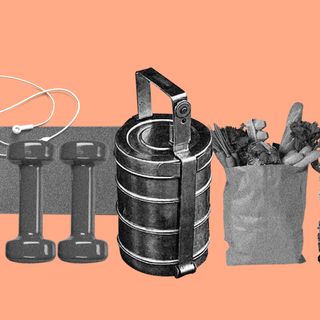The promise of a vetted stranger, the beauty of being able to jump into a different conversation in different corners of the house, the cheap indulgence of BYOB and midnight pizza, the possibility of a clandestine hook-up or a stoner sesh by the window, the validation of a group-sanctioned playlist, and the safe space of a friend’s empty house — these are the invaluable elements of a quintessential house party. Enter the morbidly depressing coronavirus pandemic that has isolated friend groups all around the world, leaving people to sustain their friendships on Zoom calls and WhatsApp chats, basically ensuring we never have another house party again. Airbnb, for example, just announced a global ban on house parties because of the pandemic and is limiting occupancy in its rental homes to 16 people. It’s also instilling a hotline to encourage neighbors to report house parties, further detracting people from the social custom. And we don’t see this changing anytime soon.
Now that an accessible, affordable vaccine is at least a few years away, and we’re all left to make safety decisions for ourselves and our families, we can safely say that the house party — in all its familiar, yet unpredictable glory — is dead, at least as far as our compromised faculties can foresee. There will be no more randomly breaking into “Gallan Goodiyan” and seeing the makeshift dance floor fill up, or the excitement of finally meeting (and getting to judge) that one dude your friend’s been going on about for the past two weeks. No more plus ones (or plus fives depending on if it’s after midnight), or mysteriously gathering in the kitchen for no reason, or experiencing the warm glow that’s unique to being slightly buzzed, surrounded by friends and friends of friends, knowing the night is certain to bring scream-singing and after-party cuddles in the middle of dawn after all the randoms have left.
Related on The Swaddle:
Blame Institutions That Failed Us, Not ‘Covidiots,’ For Covid19 Surge
The house party has always had a unique charm. It’s the stuff of legends, constantly re-remembered and recounted in friend circles for years after. And there’s something in it for everyone — be it a young school- or college-going person figuring out their drinking capacity for the very first time, and learning to flirt and navigate social boundaries in a safe and welcoming, uninhibited environment; or a working professional who is over the bar-and-club scene full of strangers and just wants to have a rowdy, fun night in with their friends.
The beauty of the house party is not only characterized by its flexibility, but also its unpredictability. We have an entire genre of teen movies that center the protagonist on their journey to find themselves, be it in a rowdy frat way epitomized in the likes of Project X, or in a contemporary coming-of-age manner glorified in Booksmart. And it’s this unpredictability that’s at the center of why we’re probably not going to be able to revive house parties anytime soon. What was once an exciting night of house-party hopping is now a superspreader event waiting to happen; what was once a generous, meaningful invite is now a suspicion-filled consideration for your and your friends’ safety; what once used to be a carefree night with friends is now laced with concerns over transportation, precaution measures, and building rules.
In that sense, it’s not just the house party we’re mourning, but its role in cementing friendships and fostering connection, weekend after weekend —especially during a time when both of those seem to be slipping out of our grasp. Taking the demise of the house party as an example, it’s also imperative we evaluate how we’re approaching the pandemic — we can’t simply bide our time, waiting for pre-pandemic routines to start up again. We might just have to make peace with new routines, in which the not-so-frivolous house party doesn’t enjoy its venerable, designated place.




